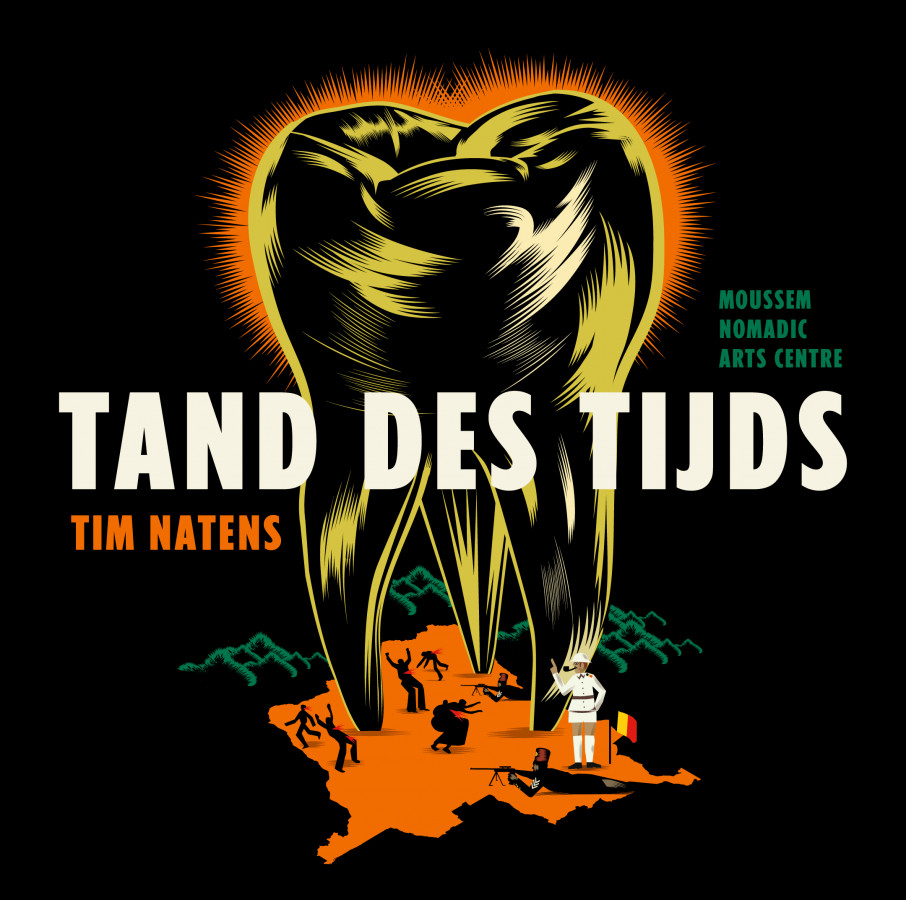
For his new performance Tand des Tijds, writer and playwright Tim Natens draws inspiration from the figure of Gerard Soete. Soete was a Belgian police commissioner tasked in 1961 with disposing of the body of executed Congolese Prime Minister Patrice Lumumba. In carrying this out, he confiscated some of Lumumba's incisors, which he then kept as private property-possibly as morbid souvenirs.
The brutal assassination of Lumumba, the first democratically elected prime minister of an independent Congo, had an undeniable impact on the country's development. Many African countries at the time were just on the verge of regaining their independence and shaping their young nation-state, making the assassination a sinister and symbolic act. In that light, Noam Chomsky calls the murder of Lumumba by the Belgian state one of the worst crimes of the 20th century.
In Tand des Tijds, Natens takes a dark piece of history and touches on a highly sensitive subject that lives on in the present. After all, the former relations between Belgium and Congo-between former oppressor and oppressed-are alive and well in the current social debates around decolonization and racism. Natens' performance deftly plays into these discussions, outlining Soete's problematic possession of a bizarre and sinister relic as a personal manifestation of a collective trauma.
LANGUAGE: Dutch
Text and Performance: Tim Natens
Final Direction: Mike van Alfen
Dramaturgy: Bart Capelle
Coaching: Jovial Mbenga, Haider Al Timimi, Jos Verbist
Scenography: Sven Roofthooft
Lighting Design: Lucas van Haesbroeck
Technical and Sound Design: Rodion Gholobov
Graphic Design: Mario Debaene
Production Management: Sandra Diris
Production: Moussem Nomadic Arts Centre
Co-production: Antigone, Monty
Special Thanks to: Christophe Engels, Destelheide Training Center, Joppe Wouters, Ludo De Witte, Walter Zinzen
With the support of: the Flemish Government, Destelheide centrum voor jeugd, kunst en creatie.
Press drive and pictures: communicatie@moussem.be
Wouter Hillaert in his review of Tand Des Tijds in Pzazz:
"This makes this monologue a powerful work that goes against the grain. Artistically, Tim Natens opts for a theatrical and psychological approach, which is increasingly rare in these times of personal performance and relativistic metatheater. Unlike many other makers today, he fully immerses himself in the role of his unreliable narrator. As a true actor, he makes that classical transformation entirely believable. At the same time, this creation stands out for its moral audacity. Without much hesitation, it manages to unite the best of both white and black representations of Congo. Even though it is a solo piece, it does not speak with a single voice. A whole choir sings along. This is exactly how you hope 'Tand des Tijds' will continue to be performed for many more audiences. The grinding of history's teeth is truly worth it."
For his new performance Tand des Tijds, writer and playwright Tim Natens draws inspiration from the figure of Gerard Soete. Soete was a Belgian police commissioner tasked in 1961 with disposing of the body of executed Congolese Prime Minister Patrice Lumumba. In carrying this out, he confiscated some of Lumumba's incisors, which he then kept as private property-possibly as morbid souvenirs.
The brutal assassination of Lumumba, the first democratically elected prime minister of an independent Congo, had an undeniable impact on the country's development. Many African countries at the time were just on the verge of regaining their independence and shaping their young nation-state, making the assassination a sinister and symbolic act. In that light, Noam Chomsky calls the murder of Lumumba by the Belgian state one of the worst crimes of the 20th century.
In Tand des Tijds, Natens takes a dark piece of history and touches on a highly sensitive subject that lives on in the present. After all, the former relations between Belgium and Congo-between former oppressor and oppressed-are alive and well in the current social debates around decolonization and racism. Natens' performance deftly plays into these discussions, outlining Soete's problematic possession of a bizarre and sinister relic as a personal manifestation of a collective trauma.
LANGUAGE: Dutch